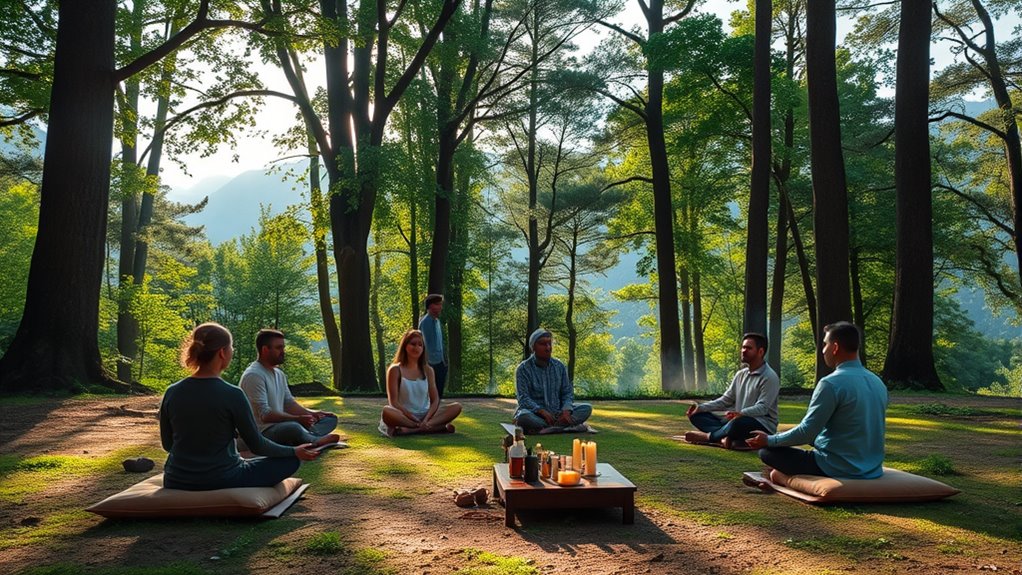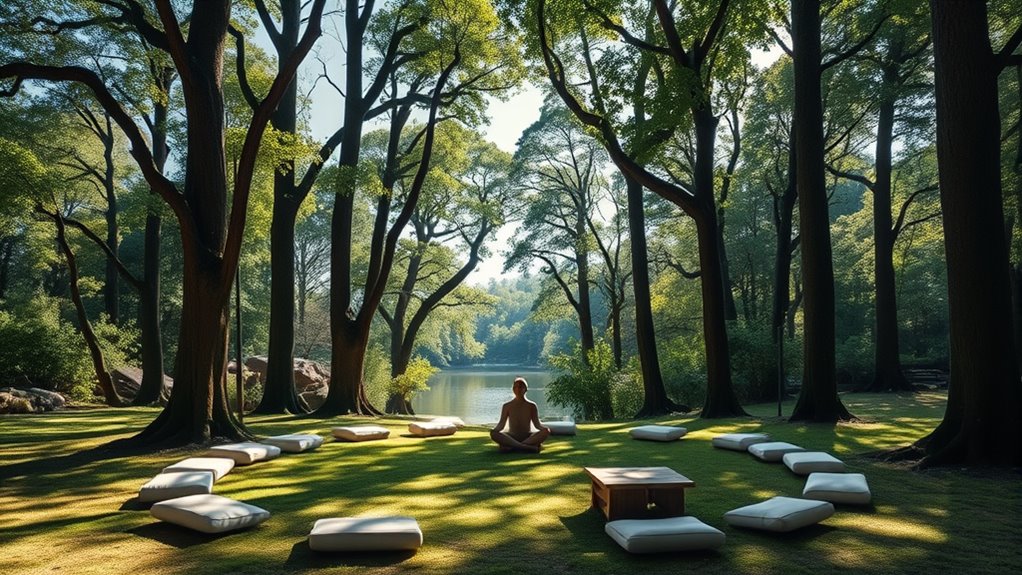At a meditation retreat, you can expect a peaceful environment with dedicated spaces to disconnect and focus on your practice. You’ll participate in multiple guided meditations, silent periods, and gentle activities, all designed to deepen mindfulness and emotional resilience. Preparing ahead by packing comfortable clothes and setting intentions helps you get the most out of your experience. If you stay curious, you’ll discover how these retreats can transform your daily life and well-being.
Key Takeaways
- Participants engage in multiple guided meditation sessions daily in a serene, distraction-free environment.
- The retreat includes practices like breath awareness, body scans, and silent meditation to cultivate mindfulness.
- Preparation involves setting clear intentions, packing comfortable clothing, and abstaining from distractions such as caffeine.
- Daily routines often feature nourishing meals, gentle movement, group discussions, and reflection time for integration.
- Benefits include increased mental clarity, stress reduction, emotional resilience, and practical tools for daily mindfulness.

Meditation retreats offer a dedicated space for you to disconnect from daily stress and deepen your practice. When you arrive, you’ll find yourself immersed in an environment designed to foster focus, calm, and self-awareness. One of the key elements of a successful retreat is understanding mindfulness techniques, which are often taught and practiced throughout your stay. These techniques help you stay present in the moment, letting go of worries about the past or future. You might learn breath awareness, body scans, or gentle walking meditations that encourage you to anchor your attention. As you progress, you’ll notice how these practices become natural tools for cultivating inner peace and clarity. Incorporating essential oils for relaxation can enhance your mindfulness experience by creating a calming atmosphere during meditation sessions. Preparing for your retreat involves thoughtful retreat preparations to ensure you get the most out of your experience. Before you leave, it’s wise to set clear intentions—whether it’s to reduce stress, gain insight, or simply disconnect from technology. Packing appropriately is also crucial; comfortable clothing, a journal, and any personal items that support your practice can make a difference. It’s helpful to familiarize yourself with the schedule and rules of the retreat beforehand, so you feel comfortable and ready to engage. Many retreats recommend abstaining from alcohol, caffeine, or other distractions to deepen your mindfulness practice and maintain a focused mindset. During the retreat, you’ll participate in daily meditation sessions, often multiple times a day, led by experienced teachers. These sessions may include guided meditations, silent sitting periods, or group discussions. The setting is usually serene, whether it’s nestled in nature or a quiet retreat center, encouraging you to let go of external distractions. You’ll learn to cultivate patience and acceptance, often through mindfulness techniques that promote non-judgmental awareness. As you settle into the routines, you might find your mind becoming clearer, your stress melting away, and your emotional resilience strengthening. Throughout your stay, you’ll be encouraged to maintain a simple, mindful lifestyle—eating nourishing meals, engaging in gentle movement, and taking time for reflection. These activities complement your meditation practice and help integrate the lessons learned. When the retreat concludes, you’ll leave with practical tools and renewed energy to incorporate mindfulness into daily life. The experience often leaves you feeling more centered, balanced, and equipped to handle life’s challenges with greater ease. Ultimately, a meditation retreat offers not just a break, but an opportunity to develop lasting habits of mindfulness that can transform your overall well-being.
Frequently Asked Questions
Are Meditation Retreats Suitable for Beginners?
Yes, meditation retreats are suitable for beginners. You’ll learn mindfulness techniques tailored to all experience levels, helping you build a strong foundation. Retreat accommodations are often comfortable and designed to support your practice and relaxation. You don’t need prior experience, just an open mind and willingness to explore new methods. The supportive environment makes it easy to start your meditation journey and deepen your understanding of mindfulness.
What Should I Pack for a Meditation Retreat?
Imagine packing a tiny backpack for a peaceful escape—no room for your entire closet! Bring meditation accessories like a cushion and incense, plus clothing essentials such as loose, comfortable clothes and layers for varying temperatures. Don’t forget a water bottle, journal, and maybe a cozy blanket. Keep it simple and functional; the goal is to focus inward, not lug around a mountain of gear.
Can I Attend a Retreat if I Have Health Issues?
Yes, you can attend a retreat if you have health issues, but you should check with the organizers first. They often consider medical considerations and may offer accessibility accommodations to guarantee your comfort and safety. Be honest about your condition, follow any guidelines provided, and bring any necessary medications. This way, you can fully enjoy the experience while taking care of your health needs.
How Much Does a Typical Meditation Retreat Cost?
Imagine a meditation retreat as a balanced meal; costs vary based on ingredients. Typically, you’ll spend between $300 to $1,500 for a weekend or week-long retreat, depending on location, amenities, and instructor. The price breakdown includes accommodations, meals, and workshops. Pricing options range from budget-friendly shared rooms to luxurious private suites. Booking early often secures discounts, helping you find a retreat that fits your budget and deepens your practice.
Is Prior Meditation Experience Necessary to Join?
No, prior meditation experience isn’t necessary to join a retreat. Most retreats welcome beginners and don’t have strict meditation prerequisites. You can participate regardless of your prior experience, as facilitators often provide guidance tailored to all levels. Just arrive open-minded and willing to learn. Whether you’re a seasoned meditator or trying it for the first time, you’ll find supportive environments designed to help you deepen your practice and achieve inner calm.
Conclusion
Starting on a meditation retreat can transform your life more profoundly than you ever imagined. As you immerse yourself in peaceful silence and deep reflection, you’ll discover a clarity so powerful it feels like opening a secret universe within. Though challenging at times, you’ll emerge rejuvenated, with a renewed sense of purpose and calm that lasts long after the retreat ends. Prepare to change your life forever—this experience might just be the most life-changing journey you’ll ever undertake.









